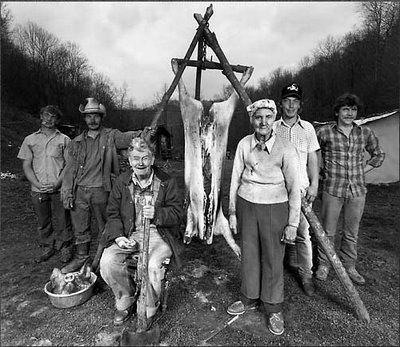
F or more than twenty five years Shelby Lee Adams has been photographing in Appalachia, documenting families residing deep in the Kentucky mountainside. His unrelenting dedication to this region is a testament to his desire to bring honor to people he has come to call family.
Shelby Lee Adams was born in Hazard, a small town in eastern Kentucky. Although he grew up in the back seat of his father's car, moving from place to place, Hazard was where he settled, living with his grandparents while he attended high school. Trapped between two world -- country kids and town kids -- Adams never fit in, immersing himself in photography books and anything affiliated with the arts. This was the mid 1960s and the Peace Corps had a great interest in the poverty sweeping the people of Appalachia. When a film crew visited his home town, Adams naturally wanted to help, taking them to his meet his grandparents and his uncle so they could film their daily lives. When the media described them as malnourished and poor, his friends and family felt betrayed. This devastated Adams, who felt he had misled the people he so dearly loved -- an experience that had a profound impact on him.
It wasn't until he left Kentucky to attend college that he understood the lessons he learned from the country people. A summer job working at a mental institution helped shape his understanding and compassion for people deemed unfit -- a lesson which helped his artistic growth. While attending junior college, Adams decided he wanted to go to art school and was accepted at the Cleveland Institute of Art. Finally surrounded by artists, he experienced a complete culture shock, rejecting his Appalachian upbringing, telling people he was from Cincinnati.
Embarrassed by his past, Adams stayed away from Hazard and his family, searching for a new identity.
By the second year in college, Adams was exposed to the FSA photographers who documented the lives of people living in poverty. Although initially defensive about the work, Adams submerged himself in documentary books, showing them to his family on a summer visit. His uncle, a county doctor, took him on house calls to meet people similar to the ones in the books. More than twenty five years later, Shelby Lee Adams is still visiting these people, returning year after year, documenting their lives.
Whether documenting a home funeral, a family gathering on the porch or the worn faces of poverty, Adams's images are so raw we want to both turn away and stare. The humanity in their faces, the comfort of their stance, are indications that an insider is showing us a reality few people would ever see. That Adams has returned to the same families for years is a testament to his dedication to show their painful existence while maintaining their dignity. Although he now lives in Massachusetts, Shelby Lee Adams's heart is forever in Appalachia.













